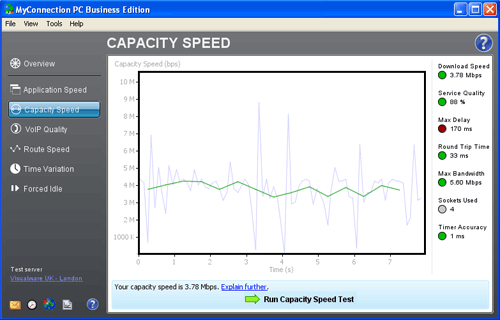
Capacity test results
Similar to the application speed test the results are displayed in graph and metric format. The metrics are explained below:
Download Speed: Capacity speed performs a UDP speed test which eliminates the inherent overhead of TCP window management to accurately assess the maximum capacity of a LAN/WAN connection. The download speed is the maximum data throughput from the server to the client that a connection can support.
Service Quality: The service quality measure is a measure of consistency of the download data flow, a key factor that affects time-sensitive applications such as VoIP and multi-media. more information
A low percentage indicates that the connection is behaving erratically. While many people assume that fast speeds are the primary consideration for good web application performance, in fact a connection with good quality (consistent download speeds) and slow speeds can provide better service than a 'faster' connection with erratic speeds.
Max Delay: The longest pause recorded between packet transfers during the download testing process. more information
For a connection that has no inherent TCP delays associated with the route the packet delays should not exceed the number of milliseconds necessary to transmit a single packet at the default MTU size at the slowest connection speed for the route. However for routes where the transmit time is faster than the route time then the larger delays will be recorded as delays will encompass the TCP forced idle time. When data quality problems exist such as dropped packets or even packet shaping policies then much larger delays will be recorded.
Round Trip Time: The length of time it takes for a packet to travel to the destination and back. Round-trip delay time is significant in applications that require two-way communication such as VoIP, where the round-trip time directly affects the throughput rate.
Max Bandwidth: The maximum speed that may be attained on the route being tested between the client and testing server. more information
The Max Route Speed is an important measure of the inherent latency in the route being tested to identify the limits imposed on the TCP stack. This measure enables users to validate that any degradation reported is a result of the route length as opposed to connection quality issues such as data loss, packet shaping and traffic congestion.
In addition, for established and permanent corporate backbone connections (such as between 2 corporate offices) the Max Route Speed identifies connection limits so the business can assess what level of connection speed (e.g. T1, T2, T3) for application use will deliver the best ROI.
Timer Accuracy: The clock resolution should never be more than 1 millisecond for accurate speed test results. Most speed testers take the simplistic approach of measuring data to the nearest second to compute a speed. The problem with this approach is that, besides not being accurate, it does not provide sufficient information to resolve problems when the connection is not healthy. A 'second' is a huge amount of time in the life of a high speed network connection, several million bits of data will pass in one second. more information |